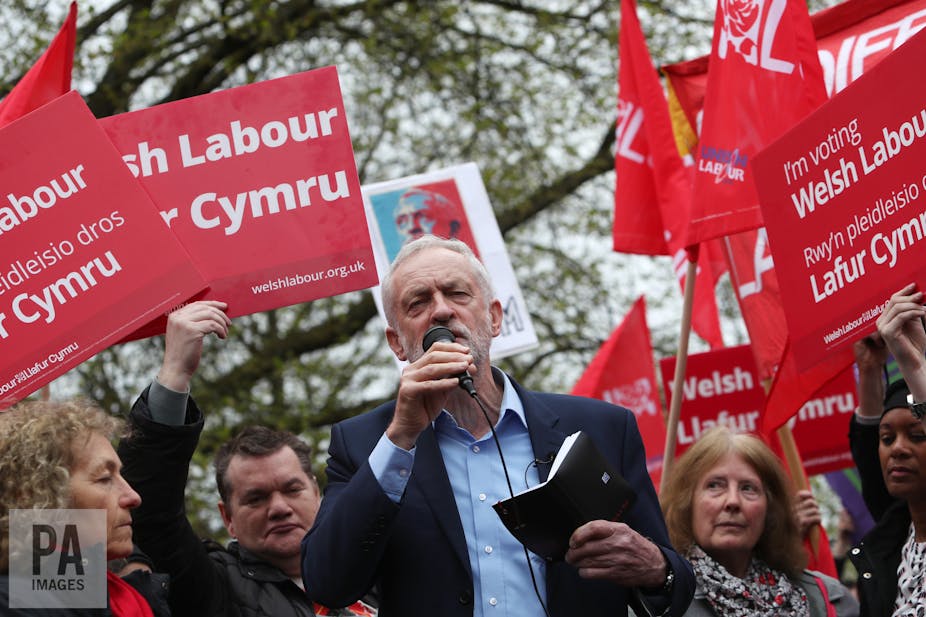The 2017 general election is being portrayed as a battle between Theresa May and Jeremy Corbyn for the role of prime minister. But across the border in Wales a very different story is unfolding.
Wales, particularly in the south, is known as the traditional Labour heartland. Welsh Labour currently controls the devolved government, and 25 of the country’s 40 MPs are Labour. Though polls initially predicted that Labour would lose its grip on Wales, the most recent from the Wales Governance Centre has found that the number of Welsh Labour MPs is in fact set to rise to 26.
For Welsh Labour, a key part of its election strategy has been distancing itself from the leader of the national party, Jeremy Corbyn. Launching Welsh Labour’s election campaign, the first minister, Carwyn Jones, who is also the leader of Welsh Labour, made no mention of Corbyn. Instead, Jones announced five pledges which included devolved policy areas already under the control of a Labour government: housing, health and education.
When the Labour Party manifesto was leaked, Welsh Labour distanced itself, saying it was not theirs and that it would instead be publishing its own policy document.
It came as no surprise really after such a denial that when the UK Labour party formally released its manifesto, there were only four paragraphs specifically about Wales – and even then they do not go into a great amount of detail. It states, for example: “We need long-term reform of how the UK allocates public expenditure to ensure that it reflects the needs of different parts of our country” but does not explain what this will entail.
A Labour partnership
It might have been expected that the party in Wales would distance itself even further from Corbyn with the Welsh manifesto, given that it seems to have mostly been left to its own devices by the national party. But it actually promises to build a “real partnership” with a Labour government. In the foreword, Jones and the shadow secretary of state for Wales, Christina Rees, argue that: “Wales needs a Labour government in Westminster that shares our ambitions”. And this is stressed throughout the manifesto: Labour in Wales can achieve more if Labour has power in both Westminster and Cardiff Bay.
There is, however, also a pledge in Corbyn’s manifesto to “make the devolution settlement more sustainable as set out by the Welsh Labour government in its Alternative Wales Bill, including the devolution of policing”. The Welsh Government wanted policing and justice powers to be devolved to Wales under the 2017 Wales Act, but were denied by Westminster. This is a major concession to Jones and the Welsh government.
Another concession to Wales from national Labour in its manifesto is the establishment of a “Constitutional Convention”, something the first minister has been calling for for some time. The convention will “look at extending democracy locally, regionally and nationally, considering the option of a more federalised country”. The Labour Party has discussed a “federal” UK in the past, but it is not clear what that federal UK will look like.
Devolution confusion
As expected, the manifesto contains numerous pages on devolved issues such as health and education. Welsh Labour could be accused of confusing the electorate by doing this: knowledge of devolved politics is not as strong as one would hope and discussing devolved issues during a general election might lead to more confusion.
Likewise, Corbyn has pledged to scrap tuition fees in England but the Welsh Labour manifesto discusses the Diamond Review into Higher Education in Wales and the Welsh government’s pledge to help with the cost of living during university, as opposed to focusing on tuition fees. Interestingly, Jones has also recently stated that Labour must look at scrapping tuition fees in Wales if they are to be scrapped in England.
However, there are some clear agreements between national and Welsh Labour, particularly on areas of policy such as the nationalisation of rail, the commitment to tidal lagoons and extending rail electrification into Wales. Policy areas which are controlled by Westminster also feature in the manifesto, such as immigration and terrorism – and these pages are largely copied straight from the UK Labour manifesto. The Welsh manifesto even includes sections on England, Northern Ireland and Scotland.
Releasing a manifesto is a clear continuation of Welsh Labour’s tactic to differentiate itself from Corbyn. While it does contain detail on non-devolved policy matters, it still highlights Jones’ determination to make the campaign in Wales about “Welsh” Labour – even if there are shared ambitions.

